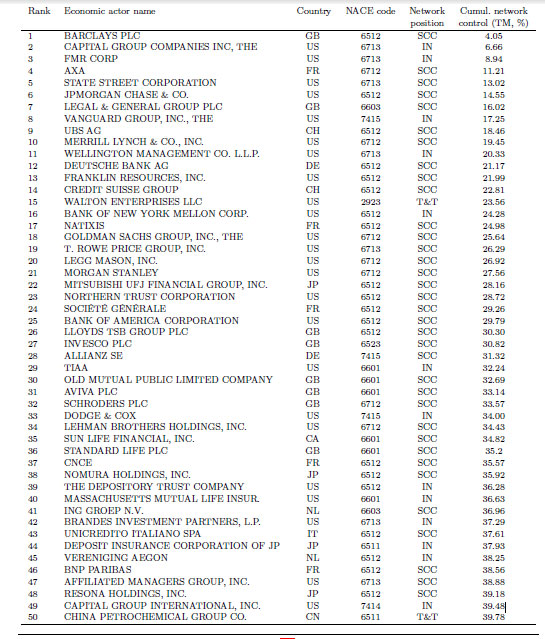- Home
- Deceptions
- Solar
- Thermal Audit
- Ventilation
- Sensors
- Governance
- Environment
- Reference
- Contact
- News
Global Corporate Control – Too big to exist
Many people suspect that large transnational corporations such as Goldman Sachs Group (US) or Sun Life Financial (Canada) are the primary beneficiaries of many governmental policies and regulations. There is also a feeling that large powerful corporations conspire with each other and this in turn is the basis for many conspiracy theories.
A recently published paper shows mathematically that there is *one* core group of tightly interconnected super nodes (powerful corporations) that dominate worldwide commerce. Their interconnected nature ensures that they have common interests, so no conspiracy is required and their massive wealth ensures that they can outright own any corrupt government that can be bought, such as the current Regime in the USA.
To show this, the authors started with 43060 transnational (TNC) corporations taken from about 30 million records in the Orbis 2007 database. They then analyzed the ownership links coming into and out of each TNC paying attention to who controls the majority of its shares. The following observations were noted:
- Mutual cross-shareholding (A owns part of B and B owns part of A) is very common. This discourages competition.
- There is only one strongly connected component in the core. If each of companies A, B and C all link to each other, then it is said to be a “strongly connected” component. Approximately three quarters of the ownership of each company in the core is held by the core itself. It is sort of like a case of extreme incest or an “old boys club”.
- Each company in the core on average has an ownership interest in 20 other core companies.
This passage from the paper sums it up nicely:
“We find that, despite its small size, the core holds collectively a large fraction of the total network control. In detail, nearly 4/10 of the control over the economic value of TNCs in the world is held, via a complicated web of ownership relations, by a group of 147 TNCs in the core, which has almost full control over itself. The top holders within the core can thus be thought of as an economic “super-entity” in the global network of corporations.” [1]
Look closely at the list of the top 50 transnational corporations in the table below, ranked by control of the global network of interconnected core companies. NACE codes that starts with 65 through 67, are financial institutions. SCC in the Network Position column means the company is part of the strongly connected core.
Number 15 is Walton Enterprises, the holding company for WalMart and its growing empire. It is classified T&T (tubes and tendrils) meaning that it is connected to the core but not as intertwined with other core members. China petrochemical group is also T&T – these make sense since they are massive, but newer players.
Members like Vanguard #8 marked IN (inward links) make sense since it holds billions in retirement investments and owns a great deal of everything.

Given that this small group of 50 companies controls 40% of the intertwined core, anything that would collectively benefit them all is something that you would expect them to try to acquire. Goldman Sachs for example, has had many former employees in high ranking positions in the US Government. Henry Paulson is a good example. What then would benefit the core?
Globalization, Automation, Banking Deregulation and tax havens are obvious areas. Of these, globalization is the most dangerous.
Free trade agreements and union busting allow human capital to be harvested at the bottom of the barrel where wages are poverty level, benefits non-existent and environmental regulations can be ignored. The only thing that gets in the way are trade protection rules and unions willing to strike. In the US and Canada, this translates having everything made in China. Walmart #15 has the most to lose from this so it should be not surprising that no Walmart store in North America has been successfully able to unionize and the total dominance of Asian made products for sale. Consumers are also partially to blame for not insisting on “made locally” products. However, with downward wages and inflation, people often shop at dollar stores out of desperation. The exodus of millions of manufacturing jobs is exterminating the middle class.
Most of the closely connected core companies are financial institutions. Finance is the only business where you can make trillions by being a parasite. They manufacture no real products and can get a small cut on every transaction. Their vast financial clout can manipulate prices globally to their benefit.
The ideal situation for them is to control the money supply of the world’s most valuable currency (via the Federal Reserve), remove all regulations to enable creative accounting (and fraud), have enough political influence to ensure that they will not be prosecuted when things go bad, promote the idea of privatizing gains and socializing losses (bailouts). Complicating tax laws helps too since transnational corporations can move product through many companies and claim the profits are incurred wherever taxes are lowest. Goldman Sachs helped Greece defraud the EU.
Significance for Canada
1. Some of the tightly connected core are right here – like Sun Life. This is not just a US problem. The core is too powerful to exist and needs to be regulated or broken up whenever possible. It is reasonable to expect that core companies will be promoting things that do not appear to be related to their apparent line of business because of the web of control.
2. Corporate lobbying and contributions to politics must be made illegal with severe repercussions for any form of bribery. Both the politician and lobbyist should be legally liable. The connected core has effectively unlimited resources to spend and will exploit every advantage.
3. All negotiations between corporate or foreign interests and politicians must be held in a public forum and recorded. Closed door negotiations should be illegal. While some deals may not happen without privacy, the potential for abusive underhanded dealings far outweighs any benefits. For example, should Canada be able to secretly negotiate trading North Atlantic fish quotas for a promise to buy Alberta wheat?
4. Harmonization of laws with other countries should NEVER be a primary goal. Corrupted regimes like the USA have many laws written by corporate lobbyists (copyright laws are a good example). These laws are not in the interest of US citizens let alone the rest of the world. Insuring our laws are similar is no different than letting the connected core companies write them for us. Why would Canadian politicians leak advance copies of laws to the US embassy for approval or feedback or as a favour?
This kind of behavior needs to land a politician in jail.
“Bernier promised to keep the Ambassador informed on the copyright bill’s progress, and indicated that USG officials might see the legislation after it is approved by Cabinet, but before it is introduced in Parliament.” — Wikileaks document here
5. Strictly enforce local and diverse ownership of media (newspapers and TV) to limit its role as a mass propaganda organ. Media ownership should never be intertwined with other commercial interests. Ideally, there would be many independent radio and TV stations. Public radio and TV should be publicly financed and completely independent of political interference.
6. Reform the voting system. One vote favors a two party system that is easily corrupted. Being able to check off all acceptable boxes on a ballot eliminates vote splitting and makes it far easier for a 3rd party candidate to get elected.
7. Implement term limits for all elected offices.
8. Pass strict whistle blower protection laws. Governmental classified documents that expose crimes should leak, and the messenger should be protected, not prosecuted.

